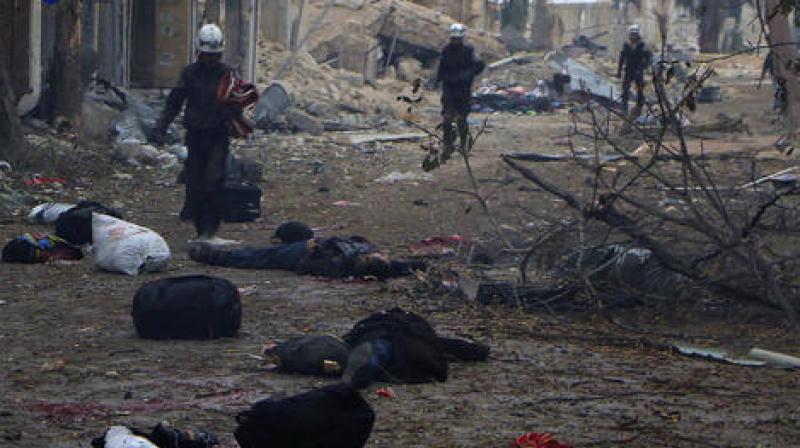Syria army retakes over half of rebel east Aleppo

Aleppo: Syria's army advanced overnight deeper into east Aleppo where it now controls more than half of the former rebel stronghold after a fierce assault that has sparked an international outcry.
Tens of thousands of civilians have fled eastern neighbourhoods of the battered city since President Bashar al-Assad's regime began its latest offensive in mid-November.
Overnight, government troops and allied forces seized the district of Tariq al-Bab where heavy fighting had raged a day earlier, the Syrian Observatory for Human Rights said Saturday.
The government has now recaptured around 60 percent of eastern parts of the city that the rebels overran in mid-2012, according to the Britain-based monitor.
The advance opens the road leading from the government-controlled west of the city to the international airport just outside Aleppo to the east, which is also held by the regime.
And it has prompted more civilians to flee, heading either further south into remaining rebel-held districts or crossing into government-held territory or areas under Kurdish control.
Assad's forces have made swift gains in east Aleppo, and its loss would be the biggest blow yet to Syria's opposition in the more than five-year-old war.
More than 300,000 people have been killed since the conflict started with anti-government protests in March 2011, and over half the country's population has been displaced.
Over 300 killed
The government has trumpeted its advances, and state television on Saturday showed buses full of residents going from west Aleppo back to their homes in neighbourhoods retaken by the army.
More than 300 civilians have been killed in the government's assault on east Aleppo since November 15, according to the Observatory.
The monitor says nearly 65 civilians have been killed in the same period by rebel fire on government-held west Aleppo, including nine on Friday.
Rebels have struggled to hold back government ground forces, who have advanced backed by air strikes, barrel bombs and artillery fire.
On Friday, they rolled back some regime gains in the Sheikh Saeed district on Aleppo's southeastern outskirts, but it was unclear how long they could hold that line.
Sheikh Saeed borders the last remaining parts of Aleppo still in rebel hands -- a collection of densely populated residential neighbourhoods where thousands have sought refuge from advancing regime forces.
In preparation for street-by-street fighting in these districts, hundreds of fighters from Syria's elite Republican Guard and Fourth Division arrived in Aleppo Friday, the Observatory said.
The fighting has prompted more than 50,000 people to leave east Aleppo for territory controlled by either the government or Kurdish forces.
On Friday, as the army advanced in Tariq al-Bab, an AFP correspondent said residents had emptied out of neighbouring Shaar district, anticipating the arrival of fighting there.
He said just a few rebels could be seen in the district, manning positions in front of shuttered shops and bakeries.
Vegetable stalls that had been selling the most meagre of supplies after more than four months of government siege were lying shattered in one street by artillery fire.
On Saturday, the Observatory said three people were killed and at least 10 others wounded in air strikes on Shaar, and that raids were targeting several other eastern neighbourhoods in the city.
The escalating violence has been met with international outrage, including a UN warning that east Aleppo could become "a giant graveyard".
Race again time
Moscow, a staunch ally of the regime, has proposed setting up four humanitarian corridors into east Aleppo.
"We have informed the UN in New York and Geneva that there is no longer a problem with the delivery of humanitarian cargo to eastern Aleppo," Russia's Foreign Minister Sergei Lavrov said Friday.
He said the UN was coming up with a plan and approval from Syrian authorities remained essential.
Moscow has announced several humanitarian pauses in Aleppo to allow civilians to flee, but until the recent escalation, only a handful did so.
Many civilians in the east previously expressed fear of leaving to government-held areas or through passages run by Moscow, which began a bombing campaign in support of Assad's forces in 2015.
But Damascus and Moscow accuse rebels of holding civilians hostage and using them as "human shields."
Of those who have fled in the east in recent days, nearly 20,000 are children, according to estimates by the UN's children's agency UNICEF.
"What is critical now is that we provide the immediate and sustained assistance that these children and their families desperately need," UNICEF spokesman Christophe Boulierac said.
"It's a race against time, as winter is here and conditions are basic."

